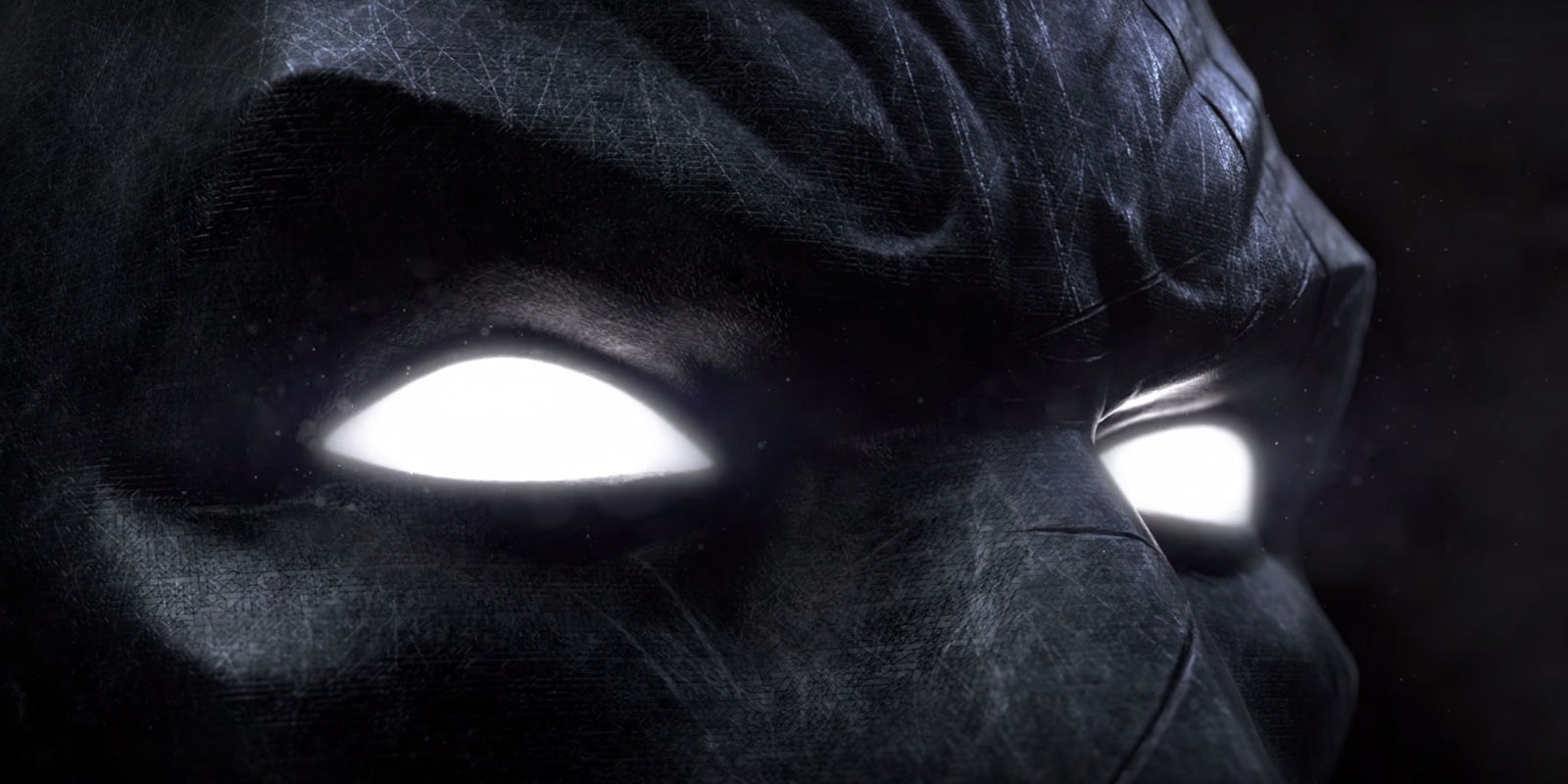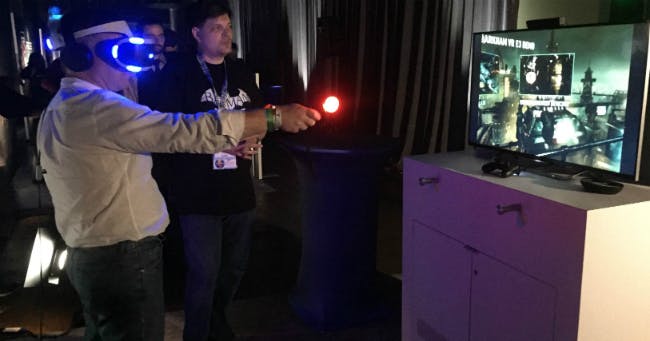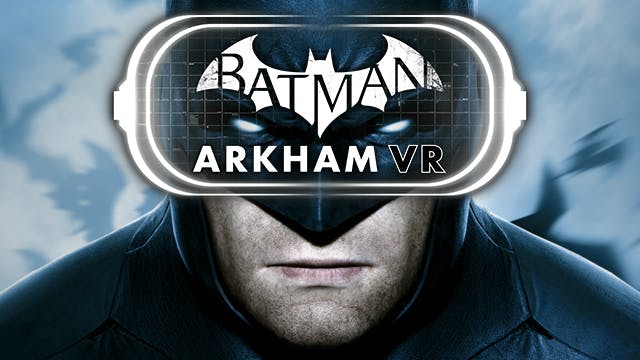If you saw an advertisement for a Batman virtual reality game during Sony’s E3 2016 press conference and scoffed, no one could blame you.
One of the many things that VR does not do well is rapid motion. Batman is a hero who swings on a grappling hook between skyscrapers in Gotham City, flips through impossible acrobatic maneuvers, and executes martial arts routines at blazing speed. Even if VR were good at handling this, it would be almost guaranteed to give you motion sickness.
On the other hand: How awesome would it be to be Batman? Fortunately, we got the chance to give it a try.
Bruce Wayne stands in a parlor in Wayne Manor, in front of a piano with a locked keyboard cover. On Bruce’s left is a old-fashioned rotary phone. On his right is his butler, Alfred, chiding Bruce for not taking a night off.
Alfred hands Bruce the key to the keyboard cover. Bruce unlocks the cover, lifts it away from the keyboard, and strikes a note revealing a hidden elevator he uses to descend into the Batcave.
Bruce steps into his grey Batsuit, pulls on his black gauntlets, dons his pointed cowl and becomes Batman, stopping to stare at his grim visage in the mirror. Only those aren’t actually Bruce Wayne’s eyes peering out from underneath the mask.
In the real world they’re my eyes, because I’m Batman. Bruce Wayne isn’t doing these things—I am. And I can’t believe Batman Arkham VR is actually working for me.
Sony devoted a healthy amount of time to PlayStation VR during its annual E3 press conference this year, and it invited guests into a virtual reality wonderland following its presentation.
Healthy number of journalists in attendance, including myself, made a beeline for Batman Arkham VR. If anyone could pull it off it’s Rocksteady Studios, the developer of Arkham Asylum, the first game that ever did true justice to the character of Batman.
Batman Arkham VR is a standing experience in two halves. You hold a PlayStation Move controller in each hand. In part one, you play out the scenario described above where Bruce Wayne descends into the Batcave and suits up.
Then you try out three essential pieces of Batman’s gear. First the grappling hook that you test-fire through a ring target, and then snap the grappling hook to your utility belt. Then a forensic scanner that can lift details like fingerprints from crime scenes. This goes on the opposite side of the utility belt.
Finally, you test a trio of Batarangs. They’re self-guided and hit their targets no matter how haphazardly you throw them using the Move controller but Batman doesn’t skimp on his gear, so of course his Batarangs don’t miss.
All of this looked extremely cool, as did descending via elevator further into the Batcave while flights of bats filled the air above me, and waterfalls cascade down the rocks all around me.
But this is all very low-hanging fruit for a VR experience. You’re more or less standing still and reaching out with your hands while looking around in what amounts to an OmniTheater projection of one of the Arkham games. It still at this point felt to me like a one-and-done tech demo for PS VR versus a proposition that could possibly support an entire game.
Then I had to decide who murdered my best friend.
The second part of the Batman Arkham VR demo places you in a Gotham City alley where you discover the corpse of Nightwing, AKA Dick Grayson, AKA the original Robin, and you have to investigate the scene using the forensic scanner you equipped in the first part of the demo.
Designing a good VR game is as much about recognizing the limitations of the hardware as understanding what it can do well, and Rocksteady clearly grasps this. Considering you spend not one second bashing bad guys or actually fighting crime, Batman Arkham VR still creates a compelling illusion of being the Caped Crusader by focusing on the other important aspect of his character. Batman isn’t only a brawler. He’s a detective.
The forensic scanner determines Nightwing’s injuries and allows you to holographically reconstruct the crime. By twisting the PS Move controller in your left hand clockwise or counter-clockwise you can advance the holographic simulation forward or backward, or pause the action to take another pass with the forensic scanner and glean further details about what happened.
You can move between four different set positions in the alley by pointing your Move controller at a position and pressing the Move button after which you “blink” to the new location. By changing positions you can view the simulation from different angles, like perching on a fire escape above, staring down the length of the alley, or standing mere feet away from the action.
Bathed in the orange lights of Gotham City at night and surrounded by vapors rising out of the sewer grates, you watch a holographic, humanoid simulacrum snap Nightwing’s neck.
Then, when you’ve gathered the final clue that will help you begin to unravel the mystery of Nightwing’s murder, the Batplane flies overhead. You grab your grappling hook off your utility belt, fire the hook at the belly of the Batplane, ascend up the rope, and the screen fades to black.
The experience only lasts for about 15 minutes. Batman Arkham VR is still more a tech demo than a demo version of a fully-fledged experience but it has the rudiments and that’s what matters. Sony needs to convince a generation of gamers that it’s worth dropping $400 on a PS VR unit, and even more money on a PlayStation camera and a pair of Move controllers.
The trick is finding a few gateway experiences that whet gamers’ appetites for more. Give them a few hours to be Batman and they’ll start thinking long and hard about whether or not PS VR really is worth their time.
Batman Arkham VR will be released exclusively for PlayStation VR this October.




